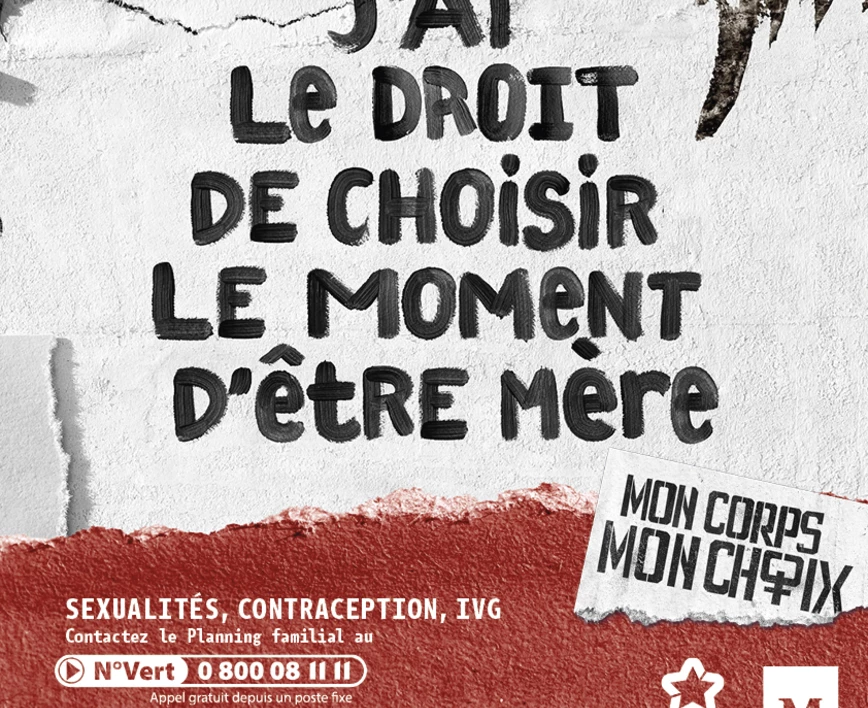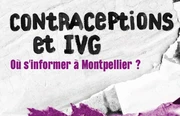Our town is also supporting the My Voice, My Choice campaign, run by numerous associations and institutions on a European scale, so that the right of access to a safe and free abortion (voluntary interruption of pregnancy) can be guaranteed to all women in Europe.
Where do we stand with abortion?
At a time when women's freedom to freely dispose of their bodies is under threat around the world, France reaffirmed the need to defend it with the law of March 8, 2024, by enshrining in its Constitution "the freedom guaranteed to women to have recourse to a voluntary interruption of pregnancy".
Historical milestones
A real upheaval in the history of French women,the adoption of the Neuwirth law on December 19, 1967 authorized the use of contraceptives. This law opened up to women the legal possibility of controlling their fertility and therefore of apprehending their sexual life and their desire or otherwise for motherhood.
The second Neuwirth law, passed on December 4 1974, democratized contraception by authorizing its reimbursement by social security and abolished parental authorization for minors.
These two laws were supplemented on January 17, 1975 by the Veil law, which authorized women to terminate an unwanted pregnancy, and today by the law of March 8, 2024, which enshrines in the 1958 Constitution the guaranteed freedom of women to resort to voluntary termination of pregnancy.
Revolutionary, these laws obtained by feminist movements opened up and maintain for French women the possibility of envisaging the personal, social and professional course of their lives without depending on unplanned births.
Unfortunately, this situation is not shared by all countries in the European community.
Abortion in Europe
The majority of the 27 countries have legalized or decriminalized abortion, with no need for justification on the part of the woman who decides to have an abortion. The maximum time limit for abortion varies from 10 weeks of pregnancy in Portugal to 24 weeks in the Netherlands, and more than half the countries have set this limit at 12 (14 weeks in France and Spain).
But restrictions on access to this right condemn hundreds of women every year to clandestine abortions in squalid conditions.
In Poland, abortion has only been permitted in cases of rape or danger to the mother's life since January 2021. After attempting to ban it completely in 2016, the government restricted it by removing the possibility of abortion in cases of serious fetal malformation, which concerned more than 90% of abortions in the country.
In Hungary, since 2022, women wishing to have an abortion have been required to listen to the fetal heartbeat during an ultrasound scan.
In Slovakia, restrictive draft legislation is introduced every year by anti-abortion parliamentarians. So far, all the drafts have been rejected, albeit by ever-smaller majorities. In Malta, the last European Union country to authorize abortion in June 2023, the law adopted is highly restrictive, allowing access to abortion only if the mother's life is in danger or the fetus is non-viable.
In Italy, while abortion is legal, in reality it is virtually impossible to access. According to a report published in 2021 by the Italian Ministry of Health, 65% of gynecologists refuse to perform abortions in the name of the conscience clause. The difficulty of access to abortion due to the conscience clause (authorized in 23 countries) is also very high in Romania, Croatia and Spain.
This situation of inequality in access to abortion is unbelievable in Europe. The aim of the Ma Voix, Mon Choix European campaign is to bring this issue to the forefront of the political stage, notably by calling for this right to be included in the European Charter of Fundamental Rights.
My Voice, My Choice campaign
The My Voice, My Choice campaign is mobilizing a dozen countries to create a European citizens' initiative in support of women in Europe who are unable to access safe, legal and free abortion.
The proposal to be tabled will demand the right for all European women to be able to have an abortion in their own country or in another European country, as well as the assumption of all costs (medical, travel, accommodation) by the European community for women from countries that restrict access to abortion.
The European Citizens' Initiative (ECI)
The ECI is the essential step for this issue to be brought before the European Commission. For it to succeed, it must gather a total of at least one million signatures in at least 7 European countries. Signature gathering began in April 2024 and will end in April 2025. Today, more than half the signatures have been collected, and the campaign is more active than ever.
By acting with its partners to make information about contraception and abortion available as close as possible to women, and by mobilizing Montpellier women and men around the Ma Voix, Mon Choix campaign, Montpellier is fully part of the historic movement for women's emancipation.

September 26 and 28: World Contraception and Abortion Rights Days
Every year, the City of Montpellier celebrates World Contraception and Abortion Rights Days alongside associations. In particular, teams from the City of Montpellier's Mission Egalité are mobilized to open up dialogue and raise awareness of the issues of contraception and abortion for everyone.
Information guide "Contraception and abortion: where to get information in Montpellier?
Designed with the area's sexual health centers and the associations of the collectif Gisèle Halimi, and in particular the Planning Familial, it brings together useful contacts in Montpellier, so that every Montpellier man and woman can easily find answers to their questions, and get support when needed.


